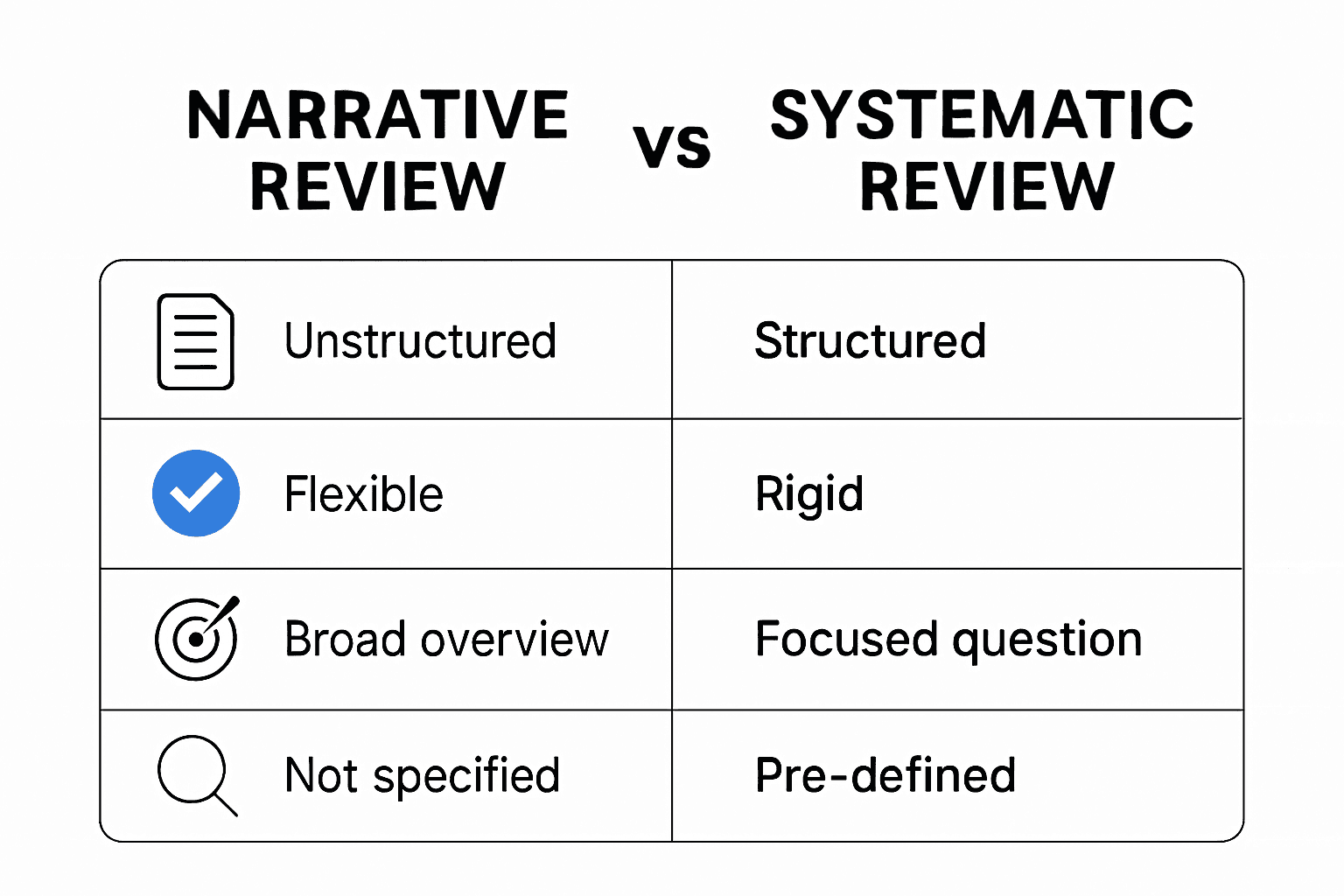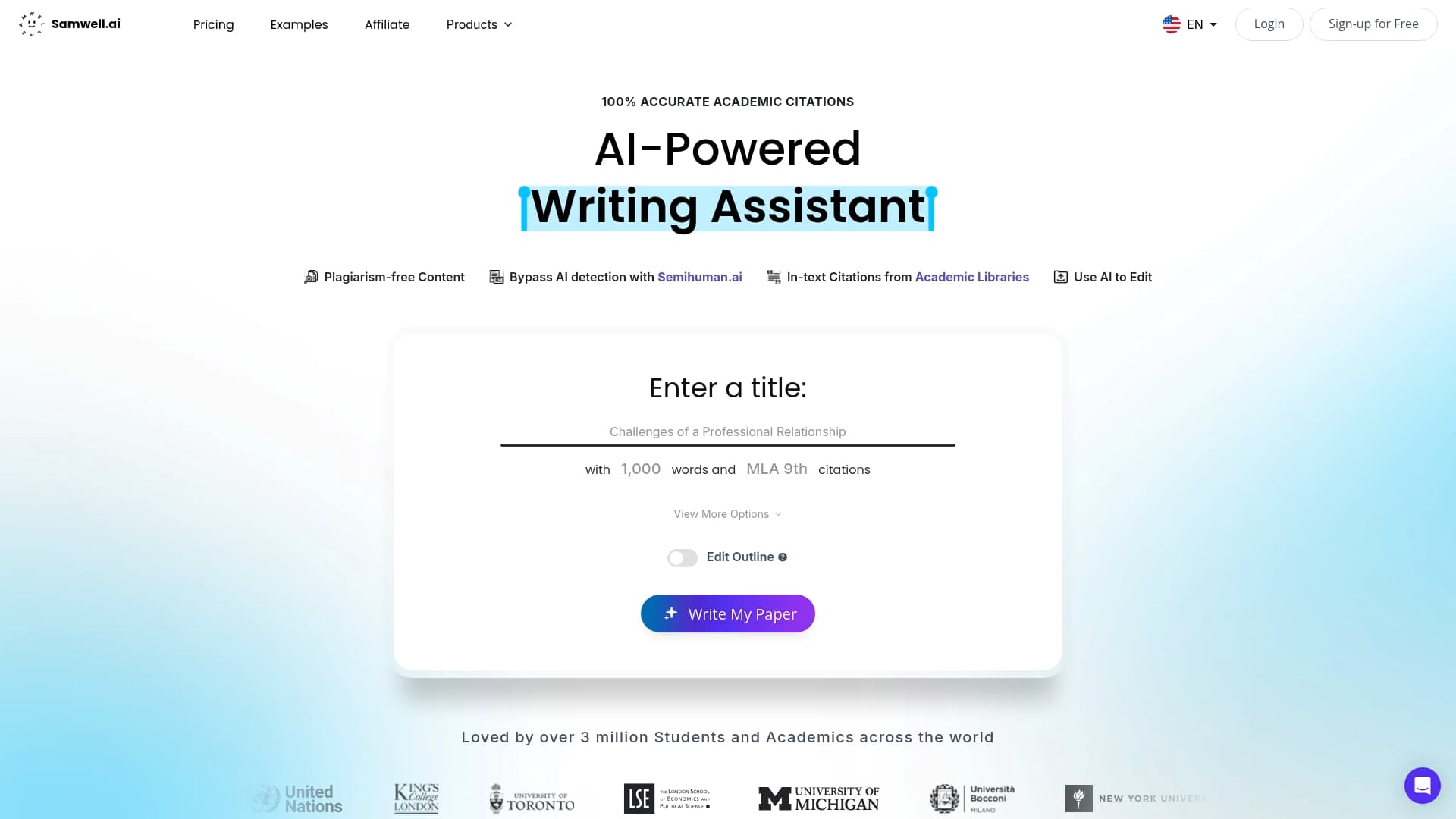Loading...

Writing a narrative review of literature might sound like a standard academic hurdle, but its impact is far from ordinary. Studies show that narrative reviews are uniquely flexible, letting researchers map out complex topics that rigid systematic reviews often miss. Here’s the twist. This flexible style is exactly what makes narrative reviews both powerful and challenging, since it demands sharp critical thinking and disciplined organization instead of just following a checklist.
| Takeaway | Explanation |
|---|---|
| Flexible Methodology | Narrative reviews allow for a more holistic exploration of research compared to systematic reviews, providing an adaptable framework for synthesizing complex academic information. |
| Robust Research Strategy | Establishing a clear research question and defined scope is essential for effective literature reviews; this guides literature searches and prevents information overload. |
| Critical Evaluation of Sources | Implementing rigorous criteria for source selection ensures the inclusion of high-quality, credible, and relevant research, enhancing the review's overall integrity. |
| Balancing Depth and Breadth | Achieving the right mix of comprehensive coverage and detailed analysis is vital for providing meaningful insights while contextualizing existing literature. |
| Emphasizing Ethical Practices | Prioritizing transparency and representation in research methodologies fosters integrity and allows diverse perspectives to be included in narrative reviews. |
A narrative review of literature represents a comprehensive approach to examining and synthesizing existing research on a specific topic. Unlike systematic reviews with rigid methodological protocols, narrative reviews offer researchers a flexible framework for exploring complex academic landscapes.
A narrative review is an analytical approach that provides an extensive overview of existing research, integrating multiple sources to create a cohesive understanding of a particular subject. Research from the University of Cambridge suggests that narrative reviews are particularly valuable for exploring theoretical concepts, historical developments, and emerging trends across diverse academic disciplines.
The primary objective of a narrative review is not simply to summarize existing literature but to critically analyze and synthesize research findings. Researchers use this method to identify patterns, discuss contradictions, and highlight potential gaps in current knowledge. By presenting a comprehensive narrative, scholars can provide context and depth that goes beyond mere data compilation.

Narrative reviews distinguish themselves through several key characteristics. According to academic research from Oxford University, these reviews are characterized by their interpretative nature, allowing researchers to present a nuanced perspective on a topic.
Key features include:
The significance of narrative reviews extends beyond simple literature compilation. They serve crucial functions in academic research by:
Successful narrative reviews require a strategic approach. Research from the SANRA Guidelines recommends a structured methodology that balances comprehensive coverage with critical analysis.
Researchers should focus on:
While narrative reviews offer flexibility, they demand intellectual discipline and systematic thinking. Researchers must navigate complex information landscapes, drawing meaningful connections and insights.
For students and researchers looking to develop advanced academic writing skills, read our comprehensive guide on crafting effective literature reviews that can help you master this essential research technique.
Crafting an effective narrative review of literature requires strategic planning and meticulous execution. Researchers must approach this academic task with precision, creativity, and a systematic methodology to produce a comprehensive and insightful analysis.
The foundation of an exceptional narrative review begins with a well-defined research strategy. Research from Stanford University emphasizes the importance of establishing a clear research question that guides the entire review process. This question should be specific, focused, and capable of directing your comprehensive literature exploration.
Key elements of developing a robust research strategy include:
Researchers must also consider the temporal context of their review. This means understanding which publications are most relevant, focusing on recent scholarship while acknowledging foundational works that have shaped the field.
Source selection and evaluation represent critical components of an effective narrative review. According to academic research from MIT, not all sources are created equal. Researchers must apply rigorous criteria when selecting and analyzing academic sources.
Critical evaluation criteria include:
The goal is not merely to collect sources but to curate a collection of high-quality, relevant scholarly works that provide meaningful insights into the research topic.
Synthesis represents the most intellectually demanding phase of a narrative review. Research from the University of Cambridge suggests that effective synthesis goes beyond summarization, requiring researchers to identify patterns, contradictions, and emerging themes across multiple sources.
Strategies for effective synthesis include:
Researchers should aim to create a narrative that not only summarizes existing literature but also provides critical insights and identifies potential research gaps. This approach transforms a simple literature compilation into a sophisticated academic contribution.
For students seeking additional guidance on mastering this complex process, explore our comprehensive guide to academic research writing that offers advanced strategies for developing exceptional narrative reviews.

Writing a narrative review of literature presents researchers with complex intellectual challenges that require strategic thinking and methodological precision. Understanding these challenges and developing effective strategies can significantly enhance the quality and impact of academic research.
Below is a table summarizing the common challenges in writing a narrative review and corresponding strategies to overcome them.
| Challenge | Description | Strategies to Overcome |
|---|---|---|
| Information Overload | Overwhelming volume of academic literature | Systematic filtering, thematic mapping, progressive narrowing |
| Synthesis Complexity | Difficulty in creating a coherent narrative from diverse sources | Develop critical evaluation skills, use thematic organization |
| Maintaining Objectivity and Avoiding Bias | Risk of personal bias in selecting and interpreting literature | Transparent methodology, consider multiple perspectives, reflexive practice |
| Balancing Depth and Breadth | Struggle to provide detailed insight while covering a broad research landscape | Hierarchical organization, comparative analysis, narrative integration |
Research from Harvard University highlights that one of the most significant challenges in narrative literature reviews is managing the overwhelming volume of available academic literature. Researchers often find themselves drowning in information, struggling to create a coherent and meaningful narrative.
Strategies to manage information complexity include:
Researchers must learn to distinguish between essential sources and peripheral materials. This requires developing critical evaluation skills that go beyond surface-level information assessment.
According to research from Stanford University, maintaining scholarly objectivity represents a critical challenge in narrative literature reviews. Researchers must consciously work to prevent personal biases from influencing their interpretation of research findings.
Key techniques for ensuring objectivity include:
Objectivity requires intellectual humility and a commitment to presenting a balanced view of existing research, even when findings challenge preconceived notions.
Research from the University of Cambridge indicates that achieving the right balance between comprehensive coverage and detailed analysis is a nuanced challenge for researchers. Narrative reviews must provide sufficient depth to offer meaningful insights while maintaining a broad enough perspective to contextualize research findings.
Effective strategies for balanced analysis include:
Researchers must develop a sophisticated approach that allows them to zoom in on specific research details while simultaneously maintaining a panoramic view of the broader academic landscape.
Navigating these challenges requires continuous learning and methodological refinement. Researchers should view each literature review as an opportunity to develop more advanced research skills and contribute meaningfully to academic discourse.
For students seeking additional guidance on managing these complex research challenges, discover our comprehensive academic writing strategies that provide practical solutions for effective literature review development.
As academic research continues to evolve, students and researchers must adapt their approaches to narrative literature reviews to remain competitive and innovative. The landscape of academic writing in 2025 demands a sophisticated blend of technological proficiency, critical thinking, and methodological precision.
Below is a summary table of best practices for conducting narrative reviews in 2025, based on the recommendations provided in this section.
| Best Practice | Key Focus Areas |
|---|---|
| Leveraging Advanced Research Technologies | AI-powered search tools, reference management software, data visualization |
| Developing Critical Research Competencies | Interdisciplinary thinking, digital literacy, analytical flexibility |
| Ethical and Innovative Research Practices | Open access, comprehensive source diversity, transparent methodology |
Research from MIT demonstrates that technological integration is transforming literature review processes. Modern researchers must become adept at using advanced digital tools and artificial intelligence to streamline their research methodology.
Key technological strategies include:
Researchers should view technology as an enhancement to, not a replacement for, critical academic thinking. The goal is to use these tools to expand research capabilities while maintaining scholarly rigor.
According to research from Stanford University, successful narrative literature reviews in 2025 require a holistic approach to research competency. Academics must develop a multidimensional skill set that goes beyond traditional research methodologies.
Critical competencies for modern researchers include:
The most successful researchers will be those who can seamlessly integrate technological tools with deep critical thinking and analytical skills.
Research from the University of Cambridge highlights the increasing importance of ethical considerations in academic research. Narrative literature reviews in 2025 must prioritize transparency, integrity, and innovative approaches to knowledge synthesis.
Ethical research practices to emphasize:
Researchers must approach their work with a commitment to academic integrity, recognizing the broader impact of their scholarly contributions.
The future of academic research demands continuous learning and adaptation. Researchers must remain flexible, technologically savvy, and committed to pushing the boundaries of knowledge creation.
For students seeking to develop cutting-edge research skills, explore our comprehensive academic writing strategies that provide innovative approaches to modern academic writing.
A narrative review of literature is an analytical approach that synthesizes existing research on a specific topic, providing a cohesive understanding while allowing for flexibility in methodology.
Unlike systematic reviews that follow strict protocols, narrative reviews offer a more flexible approach, allowing researchers to explore complex topics and provide critical interpretations of the literature.
Key steps include developing a robust research strategy, conducting comprehensive source evaluation, and synthesizing research findings to create a coherent narrative.
Common challenges include managing information overload, maintaining objectivity to avoid bias, and balancing depth and breadth of analysis to provide meaningful insights.
Stuck under a mountain of sources and worried about balancing critical analysis with clear organization? If you found the narrative review process in the article overwhelming, you are not alone. The pressure to synthesize diverse research, avoid information overload, and still produce original content that meets citation standards can feel like an impossible task. The article highlighted the real struggle with flexibility, ensuring objectivity, and maintaining academic integrity in each review.

Let Samwell.ai accelerate your writing journey today. Harness advanced tools to streamline research, use the Power Editor for precise control, and guarantee the originality your professors expect. You will gain confidence in synthesizing sources and mastering citations with every paper. Experience the benefits proven by over a million academics who trust our AI-driven writing platform. Visit Samwell.ai to start your narrative review and see quality results in less time.



